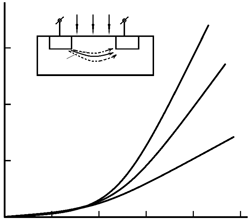Effect of penetrating radiation on sensitivity of magnetotransistors
DOI:
https://doi.org/10.3103/S0735272723060055Keywords:
magnetotransistor, magnetosensitivity, radiationAbstract
An experimental study of the effect of radiation emissions (neutrons, gamma radiation) on the sensitivity of industrial bipolar n-p-n magnetotransistors has been carried out. It has been shown that neutron irradiation leads to defects in the structure, which reduces the effective lifetime of the injected charge carriers and decreases the magnetosensitivity. Gamma radiation with increasing intensity first destroys the surface structural defects and increases the lifetime of carriers and magnetoresponsiveness, and then penetrates deeper forming defects and reducing magnetoresponsiveness. This makes it possible to use gamma radiation with an intensity of up to 107 R as a technological method of increasing magnetosensitivity.
References
- I. M. Vikulin, V. I. Stafeev, Physics of Semiconductor Devices, [in Russian]. Moscow: Radio i Svyaz’, 1990.
- M. H. Nakhodkin, F. F. Syzov, Elements of Functional Electronics, [in Russian]. Kyiv: Ukr. INTEI, 2002.
- V. G. Verbitskyi et al., Development of High-Efficiency Technologies of Optoelectronics and Communication Systems on their Basis, [in Ukrainian]. Kyiv: Logos, 2009.
- T. Yamamoto et al., “Voltage-driven magnetization switching using inverse-bias schemes,” Phys. Rev. Appl., vol. 13, no. 114045, 2020, doi: https://doi.org/10.1103/PhysRevApplied.13.014045.
- I. M. Vikulin, V. E. Gorbachev, S. D. Kurmashev, “Degradation of the parameters of transistor temperature sensors under the effect of ionizing radiation,” Semiconductors, vol. 51, no. 10, pp. 1354–1359, 2017, doi: https://doi.org/10.1134/S1063782617100190.


